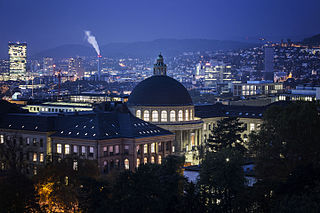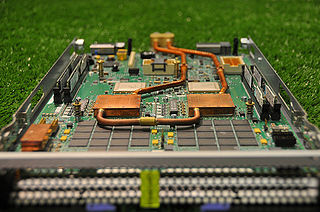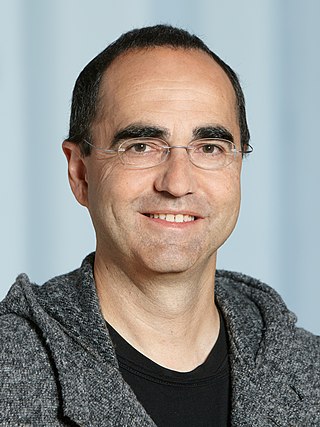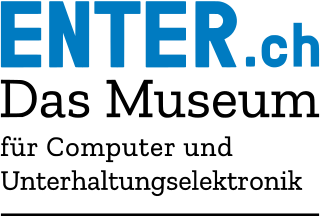
Anton Gunzinger (born 8 May 1956, Welschenrohr, Switzerland) is a Swiss electrical engineer and entrepreneur. He was a developer of high-performance parallelized computers. [1]

Anton Gunzinger (born 8 May 1956, Welschenrohr, Switzerland) is a Swiss electrical engineer and entrepreneur. He was a developer of high-performance parallelized computers. [1]
Anton Gunzinger first did an apprenticeship as a radio electrician, followed by vocational secondary school and the technical college in Biel. He then studied electrical engineering at the Swiss Federal Institute of Technology (ETH) in Zurich and graduated as an electrical engineer in 1983. This was followed by an assistant position at the Institute of Electronics with Walter Guggenbühl and the preparation of a doctoral thesis entitled Synchronous Data Flow Computer for Real-Time Image Processing. He received his Ph.D. with it in 1989. [2]
Gunzinger presented a parallel computer consisting of 18 processors connected in parallel in 1990: the Synchronous Data Flow Machine, or Sydama, as part of a system for real-time image processing. For his work on Sydama, Gunzinger won the 100,000 Swiss franc prize of the de Vigier Foundation for the Promotion of Young Swiss Entrepreneurs. [3]
As a senior assistant at ETH Zurich, he and his team developed the MUltiprocessor System with Intelligent Communication (MUSIC system). This computer system with several interconnected processors and a performance of 3.6 gigaflops (billion floating point operations per second) was one of the most powerful computers in the world at the time. [3] With MUSIC, he participated as a finalist for the Gordon Bell Award of the AMC and IEEE at the 1992 Supercomputing conference in Minneapolis in competition with the most well-known manufacturers of supercomputers, came in second behind Intel, and was honored for his efforts. As a result, Time magazine selected Gunzinger as one of the 100 upcoming leaders worldwide in 1994. [4]
In 1993, together with a business economist, he founded the company Supercomputing Systems AG in the Technopark Zurich with the aim of developing low-cost supercomputers. [5] More than 20 years later, his company is still successful, [6] with customized products being developed in a wide range of competence areas since about 1997. [7] Gunzinger was awarded a doctorate by the ETH Zurich. [8]
ETH Zurich awarded Gunzinger the title of professor in 2002, where he lectured on computer architectures in the Department of Information Technology and Electrical Engineering. [8]
Gunzinger is committed to an orientation of energy technology without nuclear power plants and reduction of the use of fossil fuels. [4] [9] He regrets the relatively slow progress in the transformation of energy production in accordance with the Energy Strategy 2050. [10]
He took a position on the management of the COVID-19 pandemic in Switzerland: in his view, consistent, comprehensive protection of at-risk groups (six percent of the total population), especially the over-80s, would be sufficient to lift restrictions for everyone else. [11] Gunzinger advocated a sweep of the under-80s, which could end the pandemic within one to two months-without overloading hospitals. In his view, the COVID-19 pandemic was as bad as the 2015 flu epidemic. [12]

Richard Robert Ernst was a Swiss physical chemist and Nobel laureate.

ETH Zurich is a public research university in Zurich, Switzerland. Founded in 1854 with the stated mission to educate engineers and scientists, the university focuses primarily on science, technology, engineering, and mathematics.

Theo Wallimann is a Swiss biologist who was research group leader and Adjunct-Professor at the Institute of Cell Biology ETH Zurich and later at the Institute of Molecular Health Science https://mhs.biol.ethz.ch/about-us/emeriti-formermembers/wallimann.html at the ETH Zurich at the Biology Department https://biol.ethz.ch/en/, of the ETH Zurich, Switzerland.
Brutus is the central high-performance cluster of ETH Zurich. It was introduced to the public in May 2008. A new computing cluster called EULER has been announced and opened to the public in May 2014.
The Swiss National Supercomputing Centre is the national high-performance computing centre of Switzerland. It was founded in Manno, canton Ticino, in 1991. In March 2012, the CSCS moved to its new location in Lugano-Cornaredo.

Gaston H. Gonnet is a Uruguayan Canadian computer scientist and entrepreneur. He is best known for his contributions to the Maple computer algebra system and the creation of a digital version of the Oxford English Dictionary.

Several centers for supercomputing exist across Europe, and distributed access to them is coordinated by European initiatives to facilitate high-performance computing. One such initiative, the HPC Europa project, fits within the Distributed European Infrastructure for Supercomputing Applications (DEISA), which was formed in 2002 as a consortium of eleven supercomputing centers from seven European countries. Operating within the CORDIS framework, HPC Europa aims to provide access to supercomputers across Europe.

Aquasar is a supercomputer prototype created by IBM Labs in collaboration with ETH Zurich in Zürich, Switzerland and ETH Lausanne in Lausanne, Switzerland. While most supercomputers use air as their coolant of choice, the Aquasar uses hot water to achieve its great computing efficiency. Along with using hot water as the main coolant, an air-cooled section is also included to be used to compare the cooling efficiency of both coolants. The comparison could later be used to help improve the hot water coolant's performance. The research program was first termed to be: "Direct use of waste heat from liquid-cooled supercomputers: the path to energy saving, emission-high performance computers and data centers." The waste heat produced by the cooling system is able to be recycled back in the building's heating system, potentially saving money. Beginning in 2009, the three-year collaborative project was introduced and developed in the interest of saving energy and being environmentally-safe while delivering top-tier performance.

Raffaello D’Andrea is a Canadian-Italian-Swiss engineer, artist, and entrepreneur. He is professor of dynamic systems and control at ETH Zurich. He is a co-founder of Kiva Systems, and the founder of Verity, an innovator in autonomous drones. He was the faculty advisor and system architect of the Cornell Robot Soccer Team, four time world champions at the annual RoboCup competition. He is a new media artist, whose work includes The Table, the Robotic Chair, and Flight Assembled Architecture. In 2013, D’Andrea co-founded ROBO Global, which launched the world's first exchange traded fund focused entirely on the theme of robotics and AI. ROBO Global was acquired by VettaFi in 2023.

Michael Franz is an American computer scientist best known for his pioneering work on just-in-time compilation and optimisation and on artificial software diversity. He is a Distinguished Professor of Computer Science in the Donald Bren School of Information and Computer Sciences at the University of California, Irvine (UCI), a Professor of Electrical Engineering and Computer Science in the Henry Samueli School of Engineering at UCI, and Director of UCI's Secure Systems and Software Laboratory.

Ursula Keller is a Swiss physicist. She has been a physics professor at the ETH Zurich, Switzerland since 2003 with a speciality in ultra-fast laser technology, an inventor and the winner of the 2018 European Inventor Award by the European Patent Office.

Peter Schweri was a Swiss artist, painter, illustrator, photographer and from 2008 on a music composer. He is a representative of the "Zürich constructivism".

Rudolf "Ruedi" Noser is a Swiss businessman and politician who served on the Council of States (Switzerland) for The Liberals from 2015 to 2023. He previously served on the National Council (Switzerland) from 2003 to 2015.

Dr. Jean-Christophe Leroux is a French-Canadian full professor of Drug Formulation and Delivery at the Institute of Pharmaceutical Sciences at the Swiss Federal Institute of Technology ETH Zürich. His research is mainly focused on broadening the field of drug delivery, and the development of biodetoxification systems for the treatment of metabolite disorders. Additionally, he has made important contributions to the field of biomaterials for use in drug delivery.
The Rössler Prize, offered by the ETH Zurich Foundation, is a monetary prize that has been awarded annually since 2009 to a promising young tenured professor of the ETH Zurich in the middle of an accelerating career. The prize of 200,000 Swiss Francs is financed by the returns from an endowment made by Max Rössler, an alumnus of the ETH. The prize money has to be used for the research of the laureate.

Gabriela Hug-Glanzmann is a Swiss electrical engineer and an associate professor and Principal Investigator of the Power Systems Laboratory at the Swiss Federal Institute of Technology (ETH) Zürich within the Department of Information Technology and Electrical Engineering. Hug studies the control and optimization of electrical power systems with a focus on sustainable energy.

Enter is a museum for computer and consumer electronics in the Swiss town of Solothurn. Now a non-profit foundation, it originated as the project of Swiss entrepreneur Felix Kunz. It is the largest private technology collection open to the public in Switzerland. Its current location in Solothurn opened in 2011.

Martin Vechev is a full professor at the department of computer science at ETH Zurich, working in the fields of programming languages, machine learning and computer security. He leads the Secure, Reliable, and Intelligent Systems Lab (SRI), part of the Department of Computer Science.

Torsten Hoefler is a Professor of Computer Science at ETH Zurich and the Chief Architect for Machine Learning at the Swiss National Supercomputing Centre. Previously, he led the Advanced Application and User Support team at the Blue Waters Directorate of the National Center for Supercomputing Applications, and held an adjunct professor position at the Computer Science Department at the University of Illinois at Urbana Champaign. His expertise lies in large-scale parallel computing and high-performance computing systems. He focuses on applications in large-scale artificial intelligence as well as climate sciences.

The Alps supercomputer is a high-performance computer funded by the Swiss Confederation through the ETH Domain, with its main location in Lugano. It is part of the Swiss National Supercomputing Centre (CSCS), which provides computing services for selected scientific customers.